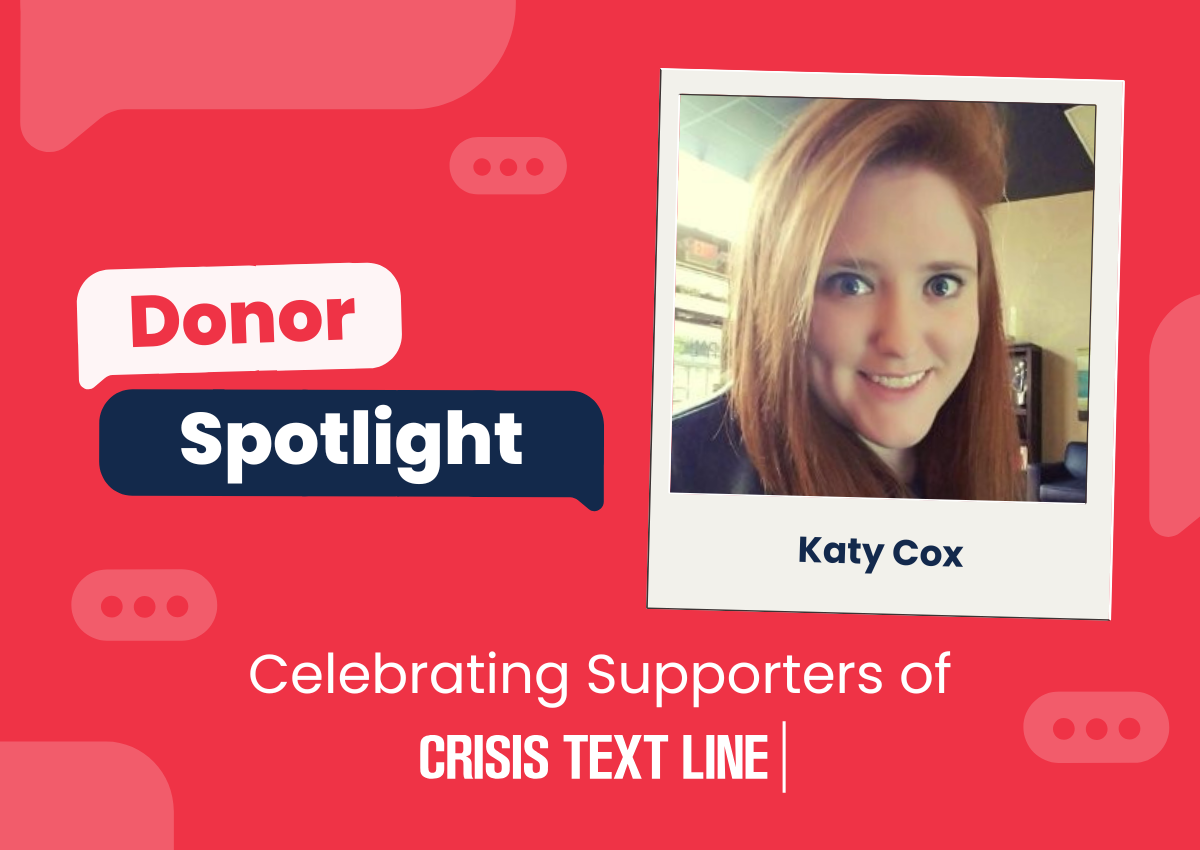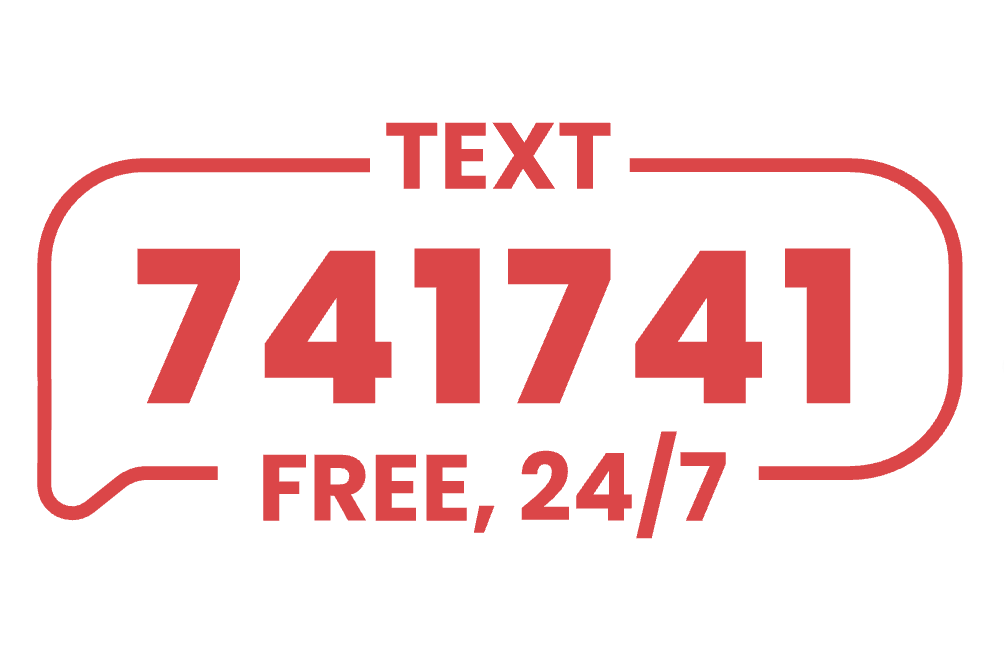Donor Spotlight: Celebrating Supporters of Crisis Text Line
Q&A with Katy Cox – Advocating for mental health awareness and support
At Crisis Text Line, our donors have a direct impact on transforming lives and ensuring those in mental health crises always have access to help. Through the generous contributions of donors such as Katy Cox, we are able to provide training and support for our volunteer Crisis Counselors, who in turn support our texters during their darkest moments.This month, we’re proud to recognize Katy—not only for her generosity as a donor and dedication as a volunteer, but also for her powerful advocacy around mental health and the importance of accessible crisis support.

Q: What initially inspired you to support Crisis Text Line?
A: Years ago, I needed services similar to those provided by Crisis Text Line. Whenever I would reach out, I experienced warmth, kindness and understanding that I will never forget. There was no judgment, and no one felt sorry for me. The support I received came from someone genuine who wanted to be there for me, even though I never shared my name. Later, when I was more settled and able, I learned about this organization through “Top of the Mornin’ Coffee.” After doing my own research, I became a supporter through monetary donations. As of late last year, I had the chance to become a volunteer Crisis Counselor, and now I can help others in need.
Q: Can you share a personal story or moment that reinforced your commitment to supporting individuals in crisis?
A: A close friend once told me they felt overwhelmed but couldn’t ask for help. They didn’t need someone to solve their problems; they just wanted someone to be there during the long nights. They felt they should handle everything by themselves and didn’t want to trouble anyone else. I encouraged them to reach out to Crisis Text Line just once to see what it would be like. When they finally did, they said it felt like a weight lifted off their shoulders. Talking with them about their experience with Crisis Text Line showed me how important it is to create safe spaces where people can ask for help without fear of judgment. Sometimes, just knowing someone is there to listen can make a huge difference. Helping someone isn’t just about fixing problems; it’s about being there during their hardest times. Taking the first step to ask for help can be the hardest part. This makes me want to encourage others to reach out, reminding them that it’s okay not to have everything figured out.
Q: Why is it important to you to support mental health initiatives, particularly crisis intervention?
A: Supporting mental health initiatives, especially crisis intervention, is very important to me because mental health challenges affect every part of life. Quick support during a crisis can be life-changing and help people through their toughest times. I believe mental health should be treated with the same urgency as physical health, and everyone should be able to get help when they need it. Crisis intervention offers immediate support and gives people the tools to handle their situations safely. Knowing these resources are available brings hope and helps reduce the stigma around mental health. Having seen the impact of mental health crises, I understand the emotional strain they can cause. Supporting these initiatives ensures that others receive the care they need, creating a community where no one faces their struggles alone.
Q: How do you see your contributions making a difference in the lives of those reaching out for help?
A: I see that my contributions make a real difference for people who need help. I provide support, care, and hope during their vulnerable moments. Whether I give money, volunteer time, or raise awareness– I know each action helps individuals in crisis get the immediate, compassionate assistance they need. Organizations like Crisis Text Line offer essential crisis intervention services for those without other options. My support ensures these services remain available, allowing trained professionals or volunteers to listen, guide, and provide important resources during tough times. Even a small contribution can greatly impact someone’s well-being, offering relief, validation, and the first step toward healing.
Q: What drives your philanthropic giving overall, and why do you prioritize Crisis Text Line in your charitable efforts?
A: I am dedicated to raising awareness about mental health and helping to solve the ongoing mental health crisis. I believe mental health is as important as physical health, yet it is often ignored or stigmatized. My goal is to help reduce that stigma, increase awareness, and ensure everyone has access to the support they need, especially in crises. I focus my charitable giving on Crisis Text Line because they offer immediate, free support to people in distress, which matches my values. Crisis Text Line provides 24/7 confidential help through text messages, making it simple for people to reach out, even if they feel scared or unable to seek help in traditional ways. This service can be a life-saving option for those who might not otherwise ask for help and is crucial for improving access to mental health care.
Q: How has giving back to a cause that is meaningful to you impacted you personally or professionally?
A: Knowing that my contributions support mental health helps me feel fulfilled. It connects me to a cause I care about, even when I can’t volunteer my time. Regular donations remind me of the importance of mental health and how they can really help people. On a professional level, my monthly donations make me feel more responsible and encourage me to think long-term. They help me align my actions with my values and show me how small, consistent contributions can lead to real change. Also, knowing that my donations support an organization like Crisis Text Line has increased my sense of social responsibility, which is now a key part of my professional identity and how I approach challenges in my career.
Q: What would you say to others who are considering donating to Crisis Text Line?
A: You never know who might need the services provided by Crisis Text Line. They don’t only help individuals who are at risk of taking their own lives. Thousands of people struggle with everyday life– and sometimes they can’t talk to anyone else about it. They are parents, children, siblings, people who need someone to lean on when the next day seems like too much. They all deserve support during those times, and this service provides that every day, 24/7, no matter what is going on in the world.
Q: How do you take care of your own mental health?
A: I take care of my mental health by being intentional about self-care and creating routines that support my well-being. I try to maintain a healthy balance between work and personal time by setting boundaries and not overcommitting myself. Mindfulness plays a big role too—I try to stay present and check in with my emotions rather than bottling things up. Journaling or just taking a few quiet minutes in the day helps me reflect and stay grounded. When things feel overwhelming, I don’t hesitate to talk to someone I trust, and I believe in reaching out for professional help if needed. Taking care of my mental health is an ongoing process, and I’ve learned to be patient and kind with myself along the way.
___
You can also make a direct impact on transforming and saving lives by donating to Crisis Text Line or becoming a volunteer. Help us support those who need it most!

